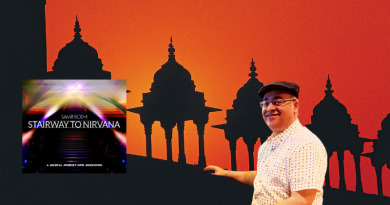Will Ackerman: A Musical Journey to Positano, Italy
(Global Heart | Esther Haasnoot) Will Ackerman, GRAMMY® Award-winning producer and founder of Windham Hill Records, has released “Positano Songs.” His first solo album in 11 years. An interview with Will Ackerman about his new album.
Piece after heartfelt piece simply materialized
 Influenced by the beauty of the city and countryside, as well as the warmth of its people, Ackerman welcomed his muse, picked up some guitars, and put his inspiration to music. His new album contains a collection of 10 songs. A splendid result of his frequent stays in Positano, Italy.
Influenced by the beauty of the city and countryside, as well as the warmth of its people, Ackerman welcomed his muse, picked up some guitars, and put his inspiration to music. His new album contains a collection of 10 songs. A splendid result of his frequent stays in Positano, Italy.
“I don’t write music in any academic sense. I’ve learned to shut out rational thought and simply feel. If I get out of the way, the music is given to me”
— Will Ackerman
An Interview with Will Ackerman about his new album: “Positano Songs”, by Esther Haasnoot
Esther Haasnoot: Music has the power to kindle emotions, moods, and states of mind. In many wisdom traditions around the world, music is used to evoke feelings of awe, surrender, trust, connection, peace, release, and ecstasy. How did you choose music – or did music choose you?
Will Ackerman: There is no intellectual component to my music. It is a realm of emotion entirely. I have no idea where the pieces come from, but I’m always grateful when they do appear.
Esther Haasnoot: Your music is often associated with New England and Northern California, where you lived and founded your music label. But Positano, a place in Italy, is also close to your heart. Your latest album called “Positano Songs” is full of love songs. It’s a beautiful tribute to the people and places in the town where you spent so much time, where you made lifelong friends, and where you married your bride. What does this album mean to you personally?
Will Ackerman: I feel more connected to POSITANO SONGS than any album I have done for decades.
I don’t mean to imply that I was indifferent to any of my albums previously, but the time between generating the ideas for the pieces in 2015 and actually recording the album reflected my ability to be involved in the melody of the pieces more than ever before. While working as a producer for many albums in the last 7 years or so, I have evolved a talent in doing guitar leads… bringing melody lines to my pieces really for the first time. While I did use cello and other instruments to “color” the pieces on POSITANO SONGS, much of the melody on the album came from my guitar. It’s been fun to cultivate a new aspect to bring to my compositions.

Esther Haasnoot: At the age of 12, you began to play the guitar. It was also the age you lost your mother. I can imagine this has been a very difficult time for you, especially at such a young age. Did music help you regain happiness? To what extent do you think this experience has determined the way you experience and create music?
Will Ackerman: I’ve always found solace in music. Even as a very young boy, music meant more to me than it did to my friends. After my mother’s suicide, I found solace in music, and in that experience, I believe I saw a role that my music could play in the world. It would be inaccurate and self-aggrandizing to say that I decided to have my music serve the role of “healing,” but apparently my music has touched others and the communication I’ve received over the years from people who have found peace in my music is something I feel very grateful for.
Esther Haasnoot: More than 40 years ago, you started what would become a worldwide movement known as Windham Hill Records. This label ignited a new genre of music and inspired millions. What were your mission and vision when you started?
Will Ackerman: The record pressing plant that pressed my first record, “The Search for the Turtle’s Navel”, had a minimum order of 300 albums. I expected I would have 200 of these in my closet for the rest of my life. It was a modest and innocent event. I frankly think that the very fact that I was NOT trying to make a commercial album is what set it apart and why it struck so many people as different and perhaps even essential.

Esther Haasnoot: Each of us is often torn between our heads and our hearts when it comes to deciding which path to take. How did honoring your own path, and following your intuition, shape your choices, in not only founding “Windham Hill Records” but also guiding the company to its success?
Will Ackerman: I had dropped out of Stanford University sometime in my late Junior Year (the 3rd year of a 4 year college). My father was the head of the English Department at Stanford and the woman who my father married after my mother’s suicide had been the head of the English Departments at Smith and Radcliffe. All I knew at that point was that instinctually I knew I had to investigate the world outside of academia.
I ended up becoming a carpenter and later a general contractor, building high-end houses. Someone recently sent me one of my business cards from around 1976: the card read “Windham Hill Builders / Records / BMI”. For a number of years, I was doing both building and playing music. At some point, the growth of Windham Hill Records demanded that I give all my attention to the music.
It was obviously the right choice as we became a company doing tens of millions of dollars and reaching millions and millions of people in the US, Europe, and Japan.
There are 14 structures on our property in Vermont; all structures I have built. I’m pretty sure that this may be the only studio in the world where a huge woodshop is immediately below a recording studio!
Esther Haasnoot: You cited exhaustion and a lack of enthusiasm for business as reasons for selling Windham Hill in 1992. Later that same year, you founded Gang of Seven, a spoken word label. A new turning point came in 1995, after a non-compete agreement with Windham Hill expired, you founded Imaginary Road, a new music label. Was there anything you could have done differently in retrospect? What insights have you gained in those in-between years, and which changes have you made?
Will Ackerman: I don’t think so, though I may have expected a response to my new endeavors to be more wildly successful… as if I could simply generate a new Windham Hill Records. I had to come to terms with the fact that Windham Hill Records was a phenomenon that could not be imitated or repeated. I had to leave the record business part of things and concentrate on what made Windham Hill great: namely the music. I remain busy in my studio producing as I have always done, but these productions are for the musicians to release on their own labels. It seems to be working beautifully for everyone.

Esther Haasnoot: Your unique approach to record-making, and your exceptional sense of balance, continue to produce records that consistently top Zone Music Reporter charts. Balancing your professional and personal life can be challenging, but it’s essential. How do you do this? What would you say matters most?
Will Ackerman: I don’t see it as difficult at all. I wake up in my house which is 70 yards from my studio. I have a light breakfast and walk across the lawn to my studio and sit down with engineer and co-producer Tom Eaton and put on my producer’s invisible hat and do what I have always done… listen, feel, offer suggestions and be enthusiastic when beauty and genius happen… which it always does.
Esther Haasnoot: How important is it to you to write and make honest music, and how do you see the future of the music industry?
Will Ackerman: I really don’t care about the music industry. I am in my own self-made little world with Tom Eaton and my assistant of 40+ years, Virginia Andrew. Here’s our list of “session players.” These are some of the most talented and famous people in the entire music world…. And they love working with us because they know they will be contributing to something meaningful and fun.
IMAGINARY ROAD SESSION PLAYERS
TONY LEVIN: BASS
John Lennon, Paul Simon, James Taylor, Peter Gabriel
STEVE HOLLEY: DRUMS
Paul McCartney, Elton John
JERRY MARROTA: DRUMS
Peter Gabriel, Paul McCartney, Elvis Costello, John Mayer
JEFF PEVAR: GUITAR
Crosby, Stills and Nash, Ray Charles, Rickie Lee Jones, Phil Collins
PREMIK RUSSEL TUBBS: SAXOPHONES AND WIND SYNTH
Whitney Houston, Sting, Santana, Duke Ellington, John McLaughlin
CHARLIE BISHARAT: VIOLIN
Mariah Carey, Bette Midler, Justin Timberlake, Rolling Stones, Alanis Morissette, Elton John, Beck, Tracey Chapman
JEFF HAYNES: PERCUSSION
Pat Metheny, James Taylor, Joni Mitchell. Alicia Keys, Nora Jones, Cassandra Wilson
EUGENE FRIESEN: CELLO
6–time Grammy winner with the Paul Winter Consort
MARC SHULMAN: ELECTRIC GUTIAR
Suzanne Vega, Chris Botti, Vanessa Williams
GUS SEBRING: FRENCH HORN
Boston Symphony First Chair French Horn
JEFF OSTER: FLUGELHORN AND TRUMPET
6-Time ZMR Album of the Year
4-Time Independent Music Award Winner
Performer on Grammy-winning and Grammy-nominated albums
Performer on flugelhorn / trumpet credits on over 60 albums since 2005
JILL HALEY: ENGLISH HORN / OBOE
Jill has performed on dozens of Imaginary Road productions
TOM EATON: PIANO, KEYBOARDS, BASS, LIGHT PERCUSSION, ACCORDION
Tom is Imaginary Road Studio’s engineer and mastering engineer
NOAH WILDING: VOCALS
Noah has performed on dozens of Imaginary Road productions
WILL ACKERMAN: GUITAR
AND OTHERS
These are some of the most talented players on the planet and they love working with us. We’ve earned their respect with our professionalism and spirit.

Esther Haasnoot: Aside from being very musical, you also love physical labor. After selling your share of Windham Hill Records, you left the hustle and bustle of California and the music business for a farm, your haven outside Brattleboro in Windham County. You built seventeen wooden buildings by yourself, including Imaginary Road Studios. How do you like the outdoors? What does your life look like now?
Will Ackerman: Well I guess we did that already. I love physical work. I think it is a very healthy balance to the minutia of recording…. “ I think the oboe needs to be up .75 db on the English Horn between 2:33 – 47.” We really talk like that.
***
About Will Ackerman
Throughout his 45-year professional career, Will Ackerman has released albums by well-known artists like George Winston, Alex De Grassi, Robbie Basho, and more. His recordings and performances have touched millions of lives. He continues today working as a producer out of his Imaginary Road Studios in Dummerston, Vermont. For more information or to connect with Will Ackerman: Website, Facebook, YouTube, Instagram, Bandcamp, Spotify, etc.
Source: Global Heart
You may also like:




